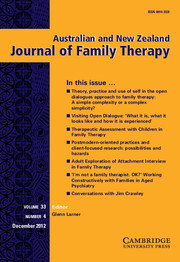Article contents
The Milan Principles of Hypothesising, Circularity and Neutrality in Dialogical Family Therapy: Extinction, Evolution, Eviction … or Emergence?
Published online by Cambridge University Press: 02 March 2012
Abstract
The primary aim of the three Milan principles of hypothesising, circularity and neutrality was to proffer an effective methodology for interviewing families, with a secondary aim of casting off the stereotypical personal therapist qualities such as intuition, charisma and concern. The progression of the principles from the original Milan model through to contemporary approaches is intriguing. The following article consists of two sections. First it tracks the progression of the three principles through the Milan, post-Milan and postmodern approaches to family therapy. Given their recursive nature, they are revealed as responsive to developments in theory and practice, as well as the influence of the wider societal context. The second section of the article explores hypothesising, circularity and neutrality in the contemporary approach of dialogical family therapy. The relevance of the three principles to the therapeutic process, the therapeutic role and the therapeutic relationship is considered. Such an exploration does not seek definitive answers or ‘truths’, but seeks to conceptualise a vague ‘knowing’ that there is continual learning and growth in grappling with the tensions in this field, in remaining ever curious, in asking the questions …
- Type
- Articles
- Information
- Australian and New Zealand Journal of Family Therapy , Volume 31 , Issue 3 , 01 September 2010 , pp. 248 - 265
- Copyright
- Copyright © Cambridge University Press 2010
- 16
- Cited by


